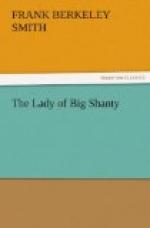Moreover, Alice was in her best humour and in her best clothes; the doctor genial; Thayor beaming; Margaret merry as a lark; Holcomb’s ease and personality a delight (Mrs. Thayor had at the last moment sent a special invitation by Margaret, and he had come)—and Jack a never-ending joy. That rare something which made every man who knew him love him, bubbled out of him as ceaselessly as the ascending commotion in the golden vintage. Moreover, this good fellow was overjoyed at the change in his host; he felt that Thayor’s splendid health was largely due to his advice.
Jack’s repertoire was famous; he had been a prime favourite at the University smokers for years, and so when dinner was over, and the guests were grouped about the roaring fire in the living room, Sperry next to Alice, Blakeman passing the coffee, liqueurs and cigars, he was ready to answer any call. And thus it was that Thayor, amid general applause, led—or rather dragged—Jack triumphantly to the new grand piano, finally picking him up bodily and depositing him before the keyboard, where he held him on the stool with the grip of a sheriff, until this best of fellows raised his hands hopelessly and smiled to his eager audience.
Few skilled pianists possessed Jack’s touch; his playing was snappy and sympathetic—it was gay, and invested with a swing and rhythm that were irresistible. He had at his command a vast host of memories—everything from a Hungarian “Czardas” to Grieg. He rippled on fantastically, joining together the seemingly impossible by a series of harmonic transitions entirely his own. His crisp execution was as facile as that of a virtuoso; he did things contrary to even the first principles found in the instruction books of the pianoforte. He rushed from the Dance of the Sun Feast of the Sioux Indians, through a passage of rag time into the tenderest of cradle songs that emerged in turn, by an intricate series of harmonic byways, into the trio from Faust and leaped, as a climax at a single bound, to the Rakoczy March—the shrill war march of Hungary, the rhythm of which stirs the blood and made men fight up hill with forty clarionets in line in the days when the Magyar took all before him—a march that brought the blood to Alice Thayor’s cheeks and diffused a lazy brilliancy in her eyes—eyes that looked at Sperry under their curved lashes. Under its spell there welled within her an irresistible desire to scream—to dance savagely until she swooned. The last chord was as vibrant as the crack of a whip.
As for Holcomb, a strange happiness had come to him. He had heard Alice voice her surprise at his ease of manner and good breeding. “He is a gentleman, Sam; I never could have believed it,” and his eyes had lighted up when his employer had replied, “As well-bred as Jack, my dear. I am glad to hear you acknowledge it at last.” But even a greater joy possessed him,—a happiness which he dared not speak about or risk the danger




